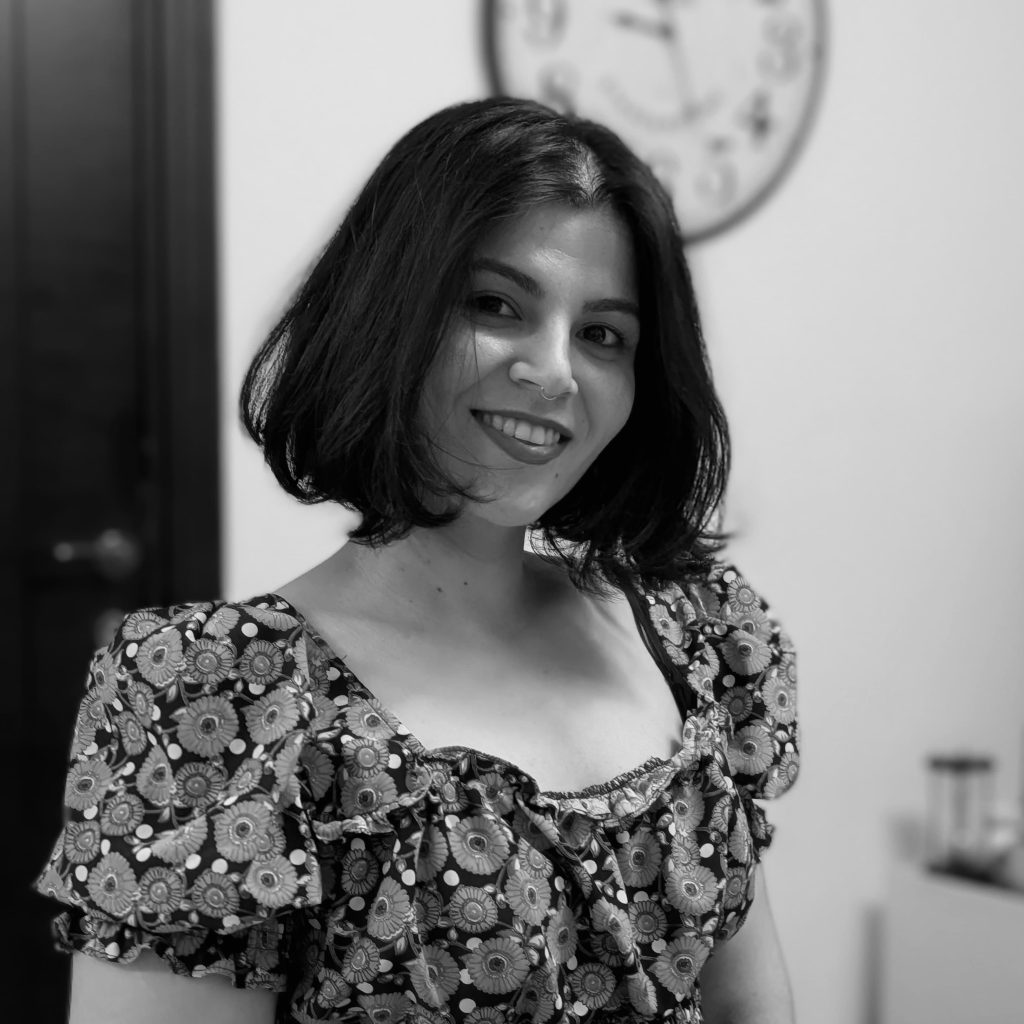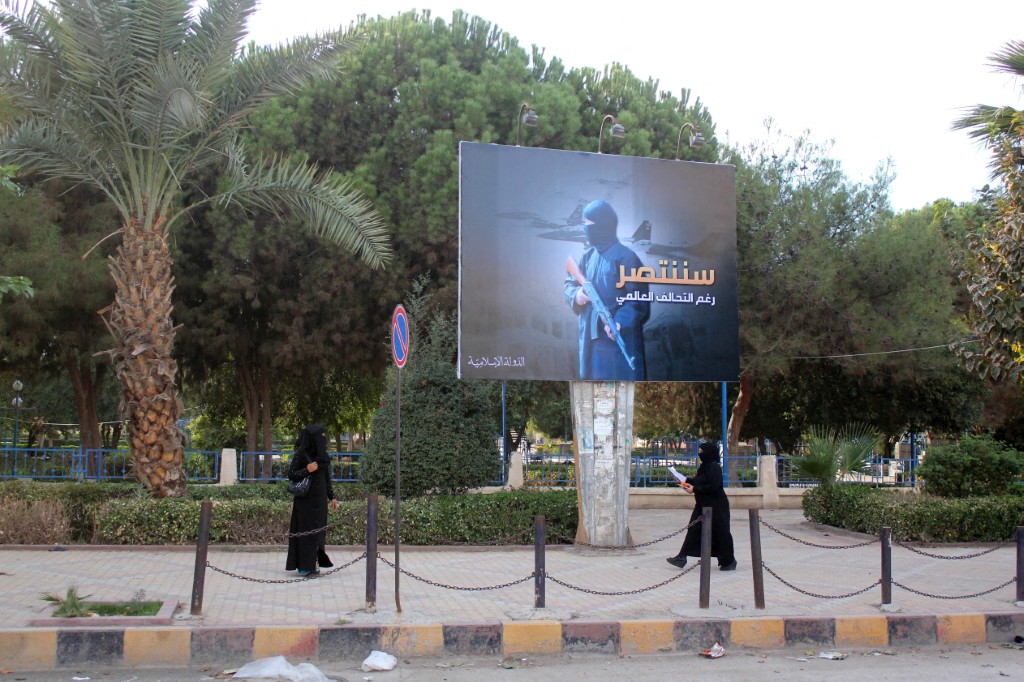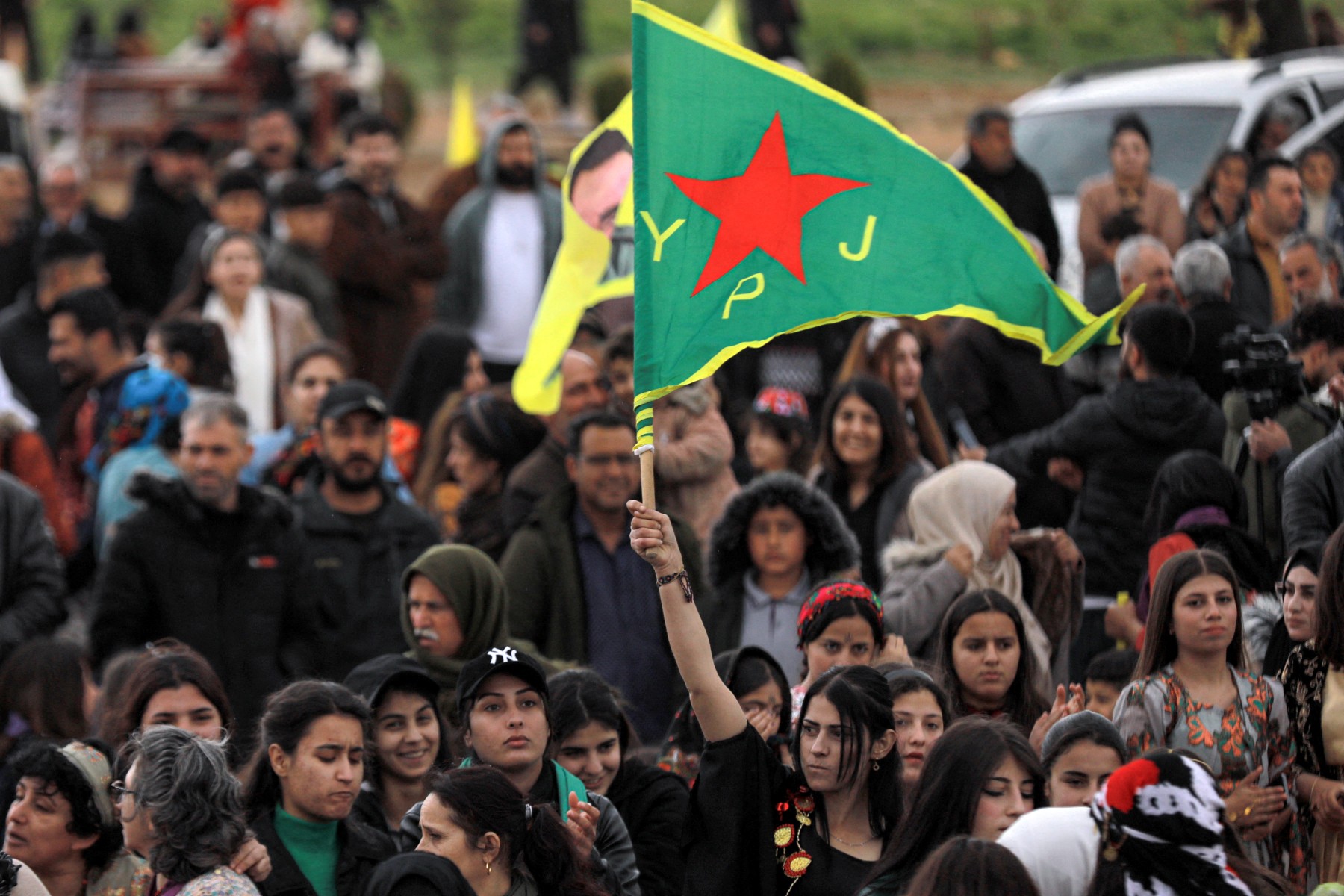From Sewing Machines to Smartphones: Kurdish Women Build Businesses on Instagram

Close up of a smiling woman holding mobile phone while sitting outdoors at the park
While responding to constant messages from her customers on her Instagram shop, Payam often replies with her young daughter by her side. Balancing childcare and household routines, she coordinates UK-based buyers for her cosmetics shop and home-based tailors for Brandî Kenî. Payam turned down early offers of family money, choosing instead to learn each step of business on her own, thereby gaining financial independence.
A few kilometres away, Shene, a Fine Arts graduate and a mother of two, founded Shene Art and Jewelry, a line of handmade accessories that uses traditional Kurdish fabrics, motifs, and materials. Shene promotes her products through carefully shot photos on her Instagram page and in-person at various handicrafts exhibitions and events. “Having your own business, where you are your own boss, is much better,” she told The Amargi. “It is very difficult… however, if you love your work, you will succeed,” she added.
The choices of these young Kurdish women, just two examples of many, reflect a wider economic shift among small business owners. Iraq’s digital space is no longer niche; the country has 34.3 million social media users and 38 million internet users as of 2025, representing about 74% and 82% of the total population, respectively. However, the online move is workaround, not a resolution for small businesses.
In Kurdistan Region of Iraq (KRI), women’s labour participation remains at 16.5%, with unemployment at 29.6%. Only 14.9% of Iraqi women hold accounts, and just around 10% of adults made electronic payments in 2021. While the growth of digital space shows potential, most women remain excluded from the foundations of work and finance—if one walks into a room of ten working-age women in the KRI, only one or two will have paid work. Most of these jobs will be in teaching, nursing, or the public sector. The rest remain outside the economy, even if they are educated and hold a university degree.
This exclusion is compounded by financial barriers. Across Iraq, numbers show that the banking system still serves men far more than women. Without accounts or access to credit, income from online shops often passes through male members of the family, undermining women’s autonomy and financial independence. In this sense, social media businesses in the KRI expose both the potential and the precariousness of women’s economic presence.
For Payam, her business is not just about sales. “We are not just making money; we are waging a struggle,” she told The Amargi. In her eyes, the battle is against a suspicious community that believes a working mother neglects her child, that a woman who pursues money is greedy, or that any success must secretly be funded by a man. “If my husband helps me, people say ‘Mashallah, what a supportive man!’ If I work, they say, ‘Her husband is providing for her anyway.’”
For Payam and Shene, motherhood further deepens the contradictions they face. They often work late into the night after putting their children to sleep. Both women describe the weight of social judgment alongside the practical exhaustion of coordinating childcare, housework, and entrepreneurship. “Sometimes people ask me, ‘How do you manage? Having children, a household, and this work?’” Shene said. “Many give up after a year. But if this is your passion, you can continue,” she added.
Savan Abdulrahman, a Kurdish author and researcher, sees this as a structural issue. “A woman cannot decide on her own when to leave the house, what to wear, or what time to come home,” she told The Amargi. “Working from home fits well into that system. It does not really challenge this arrangement,” she continued.
The online market itself remains unstable. Iraq’s e-commerce revenue was estimated at $702 million USD in 2024, accounting for only 5–10% of retail sales, but expanding by 10–15% annually. However, almost all orders end in cash-on-delivery. A recent Rest of World report found that 98% of transactions on Miswag, Iraq’s largest e-commerce platform, were cash payments.
For women, the implications are clear. Their independence is undermined when money must pass through couriers or family members. Without direct digital access, their earnings remain vulnerable to control by others. Financial inclusion, according to Savan, is not a technical side issue but foundational for individual autonomy.

Savan Abdulrahman
Given the financial crisis of the past 15 years, necessity is often the motivation. As Savan noted, young women may need 150,000 – 200,000 dinars ($114 – $115 USD) per month just for personal essentials like hygiene products or clothes, while the minimum wage is around 400,000 dinars (around $305 USD). In a family already under financial pressure, these costs drive women to seek their own income streams. In that sense, Instagram shops are not luxuries; they are survival strategies.
Shene recalled that even at exhibitions, she sometimes stayed until after midnight, relying on taxis or her husband to get home. “I’ve never had problems, but for some families, this would not be acceptable,” she said. “Some still say, ‘We don’t want our daughter to be seen,’ even if the work is respectable,” she added.
This pattern is not unique to Kurdistan. In Saudi Arabia, before women were allowed to drive or join most workplaces, thousands were running Instagram shops from home, selling food and clothes. Scholars have long described these ventures as a “patriarchal bargain”, as income gained within the boundaries set by families.
The Kurdistan Region of Iraq does, however, stand out because of a paradox. Women are often highly educated and digitally connected, but remain largely absent from the formal workforce. This creates a double image: on one hand, the modernity of Instagram feeds filled with bright products, and on the other, the old reality of patriarchal control inside the home.
The question is whether such businesses can grow into something more durable. Payam asked this herself: “Everyone is starting, but who will endure? Who can last five years when Instagram rules change?”
Savan points to what is needed: training in marketing and design, access to small loans, and above all, digital financial services so women can control their own money. Without such infrastructure, Instagram shops remain fragile, always one algorithm change or a family argument away from collapse.
Still, the change is undeniable. A decade ago, women risked being shamed simply for posting photos online. Today, mothers like Payam and Shene are selling, hiring, and supporting others through their work on social media platforms. Each sale is a step into the economy and a challenge, shaping the struggle over women’s role in society.
Smartphones and social media presence can generate incomes, but they cannot erase laws, customs, or violence. Until those changes occur, independence for women will remain conditional in the Kurdistan Region, always at risk of being withdrawn.
Rebaz Majeed
Rebaz Majeed is a Kurdish journalist, researcher, and photographer based in Berlin whose work bridges conflict reporting, academic inquiry, and digital fact-checking. He has covered politics, migration, and security in Iraq and the Kurdistan Region for Voice of America, and later worked with Lead Stories as TikTok’s fact-checking partner for the MENA region, specializing in misinformation and digital verification. His research has explored gender, violence, and political dynamics in Iraq. A polyglot journalist, Rebaz holds a BA in International Studies from AUIS and an MA in Interdisciplinary Studies of the Middle East from Freie Universität Berlin.



